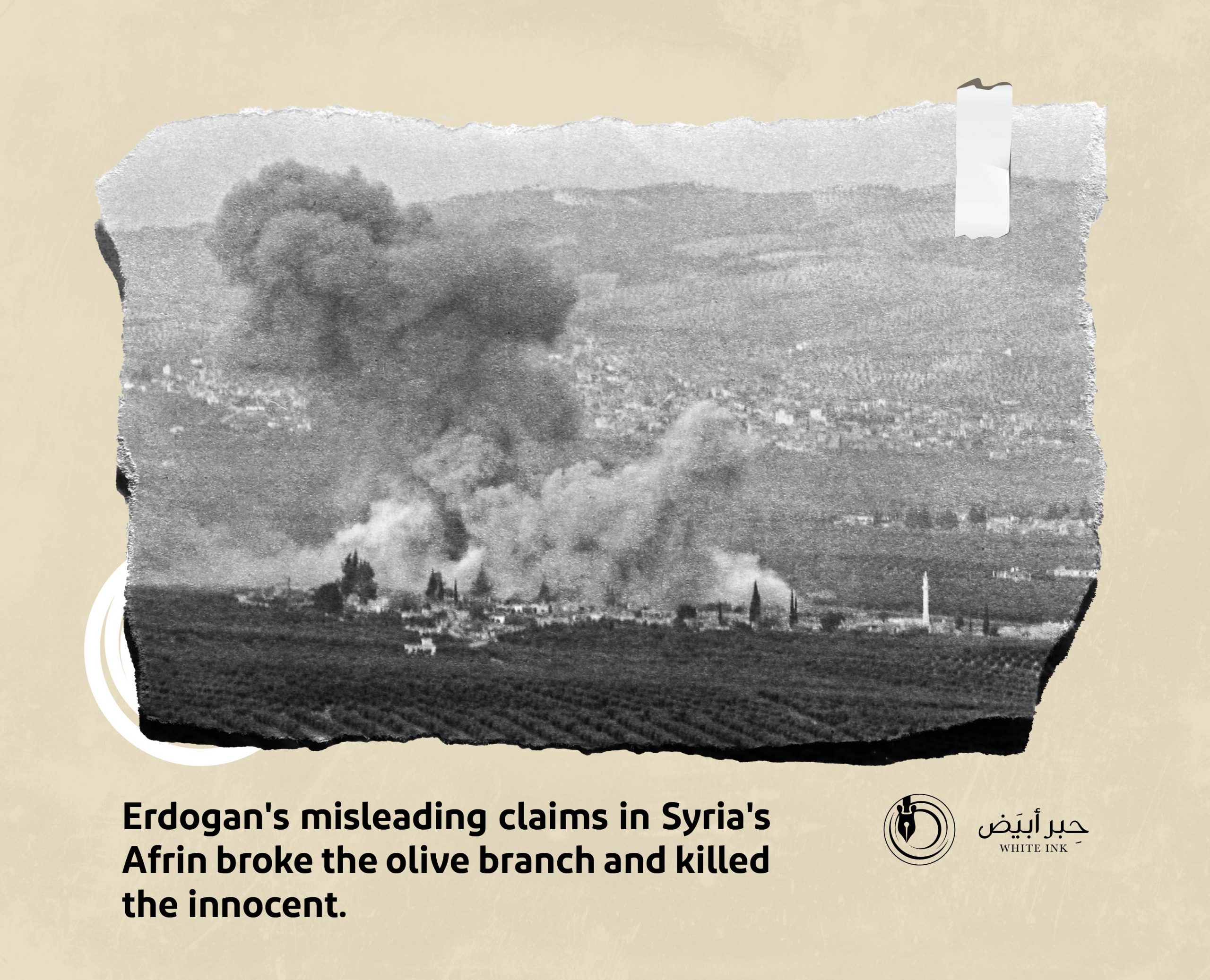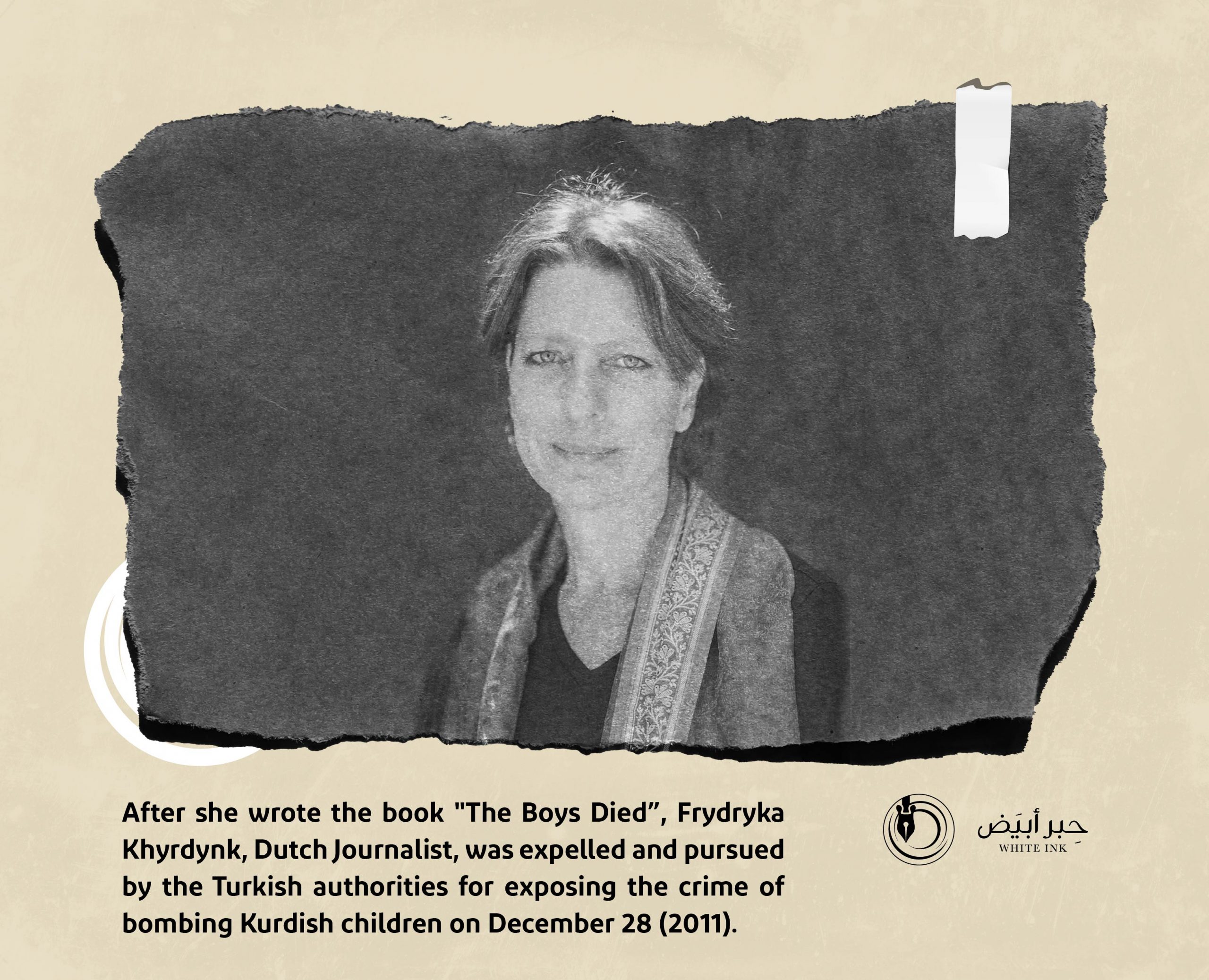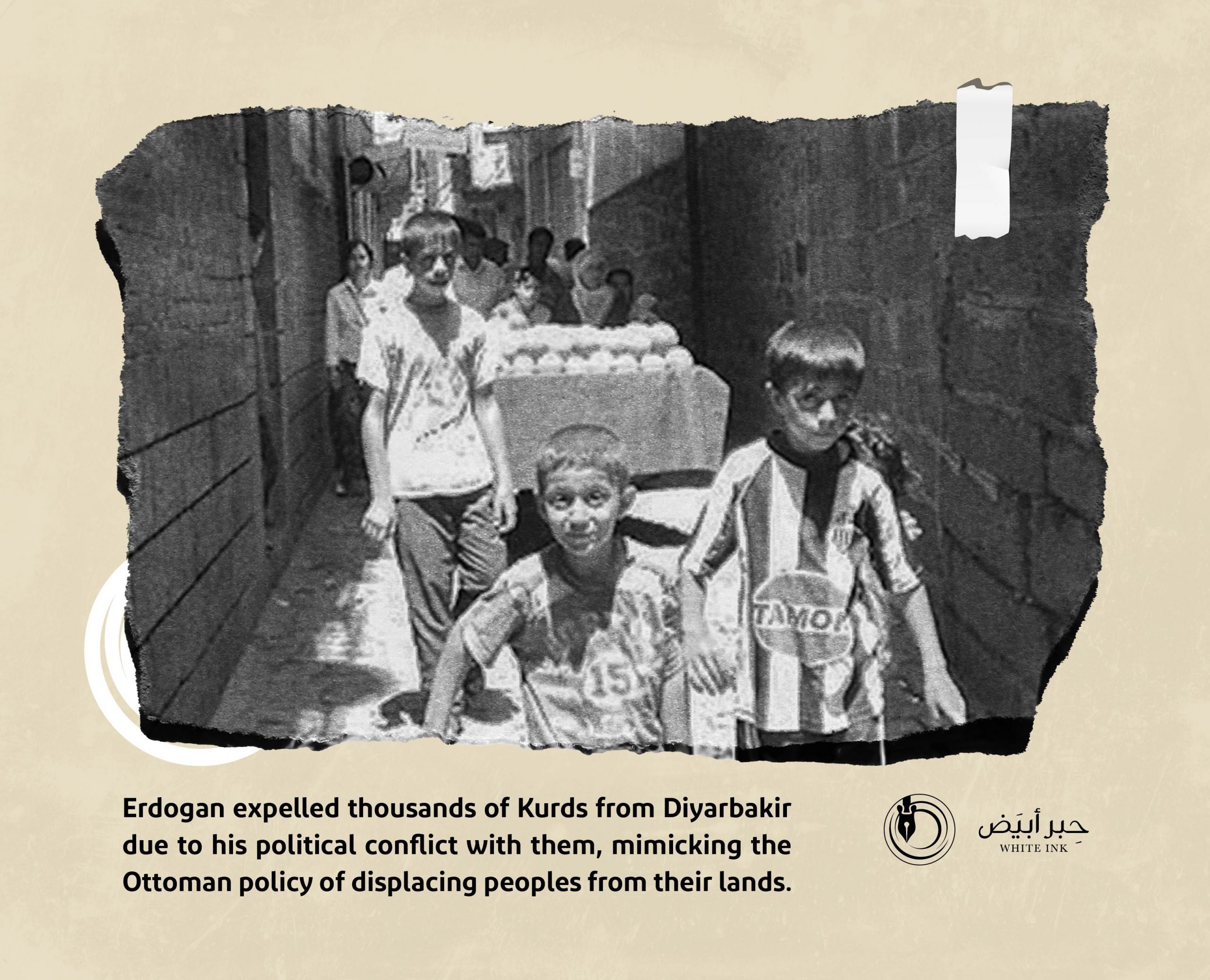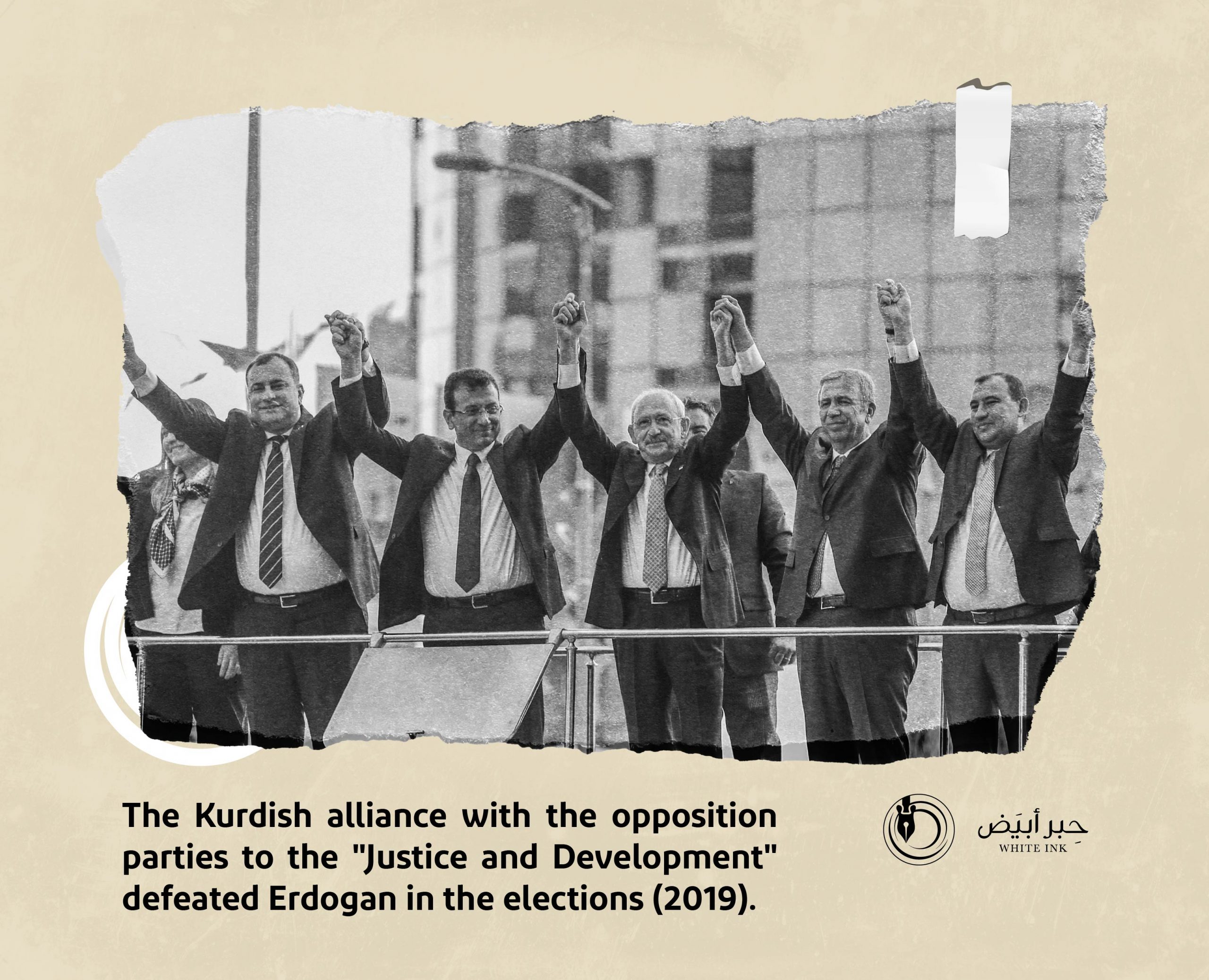
The Collective Punishment Method
The Turkish Regime perpetuate the old Turkish approach in dealing with the Kurds
South African Nelson Mandela said, “A man who deprives another man of his liberty is a prisoner of hatred, prejudice and narrow-mindedness.” This applies to Turkish President Recep Tayyip Erdogan’s dealings with the Kurds in line with the history of the relationship between the Ottoman sultans and the Kurds, and this confirms the historical stability in the Turks’ handling of the Kurdish issue through the duality of containment and oppression without any indications of willingness to listen to the demands of this Muslim people, who demand a political agreement that grants them a margin of freedom to conduct its administrative and economic affairs in an expanded decentralized framework under Turkish sovereignty.
In this regard, Erdogan took advantage of the European & the American cover, which classify the Kurdistan worker’s party “PKK” as a “terrorist group”, in order to legitimize the brutal attacks against one of the oldest indigenous peoples in the region. It seems that Ankara took advantage of this classification in order to expand its borders at the expense of neighboring countries, which are in a state of internal war, under the pretext of protecting its vital depth from “terrorist” threats.
On 28 of December, 2011, A Turkish squadron targeted a group of Kurds who were on a regular smuggling flight between the Kurdish lands, an activity that was widespread in this region and takes place in full view of the Turkish army, the outcome, 34 Kurdish, most of them under the age of eighteen, were killed in a brutal operation whose memory still hunts the minds of the Kurds.
Turkey refused to admit the crime and insisted that the raids targeted “terrorist operatives” affiliated with the Kurdistan worker’s party “PKK”, before it back out under the leverage of photos and videos documenting the crime, and under pressure due to the demands that called for “the need for a transparent investigation, announcing those responsible for the crime, bringing them to trial and achieving justice.”
Turkey refused to admit the crime of bombing and killing 34 Kurds, most of them were children, in (2011).

The scarcity of reliable original sources that can be used to document this massacre, should be noted, in view of the systematic media blackout practiced by the Turkish authorities on the incident, except for the investigative book written by Dutch journalist Frydryka Khyrdynk entitled “The Boys are Died: The Roboski Massacre and the Kurdish Question in Turkey”, which is the only reference that documents this crime in detail that enrich the researcher from other writings that addressed this brutal, painful event.
The accuracy of the Dutch journalist used to address with the events provoked the Turkish authorities, who called her “the whore of terrorists”, especially after the conclusions she reached, which is that “the killing was deliberate targeting the Kurdish people.” This summary, issued by a neutral journalist, prompted Ankara to expel the journalist Frydryka (2015) and prevent her from entering Turkey.
The siege of the Tyre region in the center of Diyarbakir was a permanence of the tough approach adopted by Ankara in dealing with the demands of the Kurdish people. According to the Turkish narration, the siege of the area occurred due to the declaration of some activists in the Autonomous Region of Tyre, which is a form of administrative decentralization and has nothing to do with any separatist or independence demand.
"Ankara" expelled the Dutch journalist, Frydryka Khyrdynk; as she proved that the killing of innocent Kurds was intentional.

In this regard, although this initiative was caused by some Kurdish operatives, yet the Turks imposed a suffocating siege on large parts of Diyarbakir, which resulted in many civilian deaths, whose numbers, according to Amnesty State statistics, are estimated at 368 people, in addition to the displacement of more than 24 thousand people from Tyre alone.
The siege of these areas of Kurdistan lasted for more than three months, which was enough to stifle the economy of the region, starve its inhabitants, and force them to leave their homes in poor conditions. This situation is described by Amnesty International’s report in January (2016) by saying that: “those inhabitants residing in areas that external observers are currently unable to enter, such fact shows the vulnerable circumstances these inhabitants are currently experiencing as a result of harsh and arbitrary measures.”
The Turkish regime resorted to the method of collective punishment against the inhabitants of Diyarbakir considering its political and historical symbolism, which fueled feelings of hostility towards Erdogan’s regime in light of the policy of starvation and siege practiced by Ankara, which was described by John Dalhousien, Director of the Europe and Central Asia Program at Amnesty International, by saying: “The cuts to water supply and electricity, in addition to the risks of accessing food and medical care, while those areas are under fire, all have a catastrophic impact on the population.”
Giving the Roboski bombing incident and the siege of Diyarbakir, it becomes clear that the Turkish approach towards the demands of the Kurds represents a permanence of the eradication policy that Turkish politicians practiced for centuries against a people who preceded them to history and to the land, a people who had a decisive contribution to building the pillars of the Ottoman Empire when the first founders were on the margins of history and outside Geography context.


- Bedirkhan Ali, “Because We Are Kurds: The Story of the “Roboski” Massacre and the Myth of the Turkish Judicial System,” a scholarly article published on Hafryat website, January 9 (2020).
- Frydryka Khyrdynk, Boys died; Kurdish massacre Robosca issue in Turkey, translated by Kevork Khatun Wanis (Beirut: Dar Al-Farabi, 2018).
- Amnesty International report (January, 2016) about the siege of Tyre, the center of Diyarbakir.


The Policy of Demonizing the Innocent
Erdogan broke the “Olive Branch” with toxic "Napalm" gas in "Afrin"
Behind Operation “Olive Branch”, launched by the current Turkish President Recep Tayyip Erdogan, stands a small Syrian Kurdish city called Afrin, which is the key to occupying Upper Syria when the historic opportunity that the neo-Ottomans envisage comes. Since the Turks see the Kurds as the biggest obstacle on their way to occupying the Arab countries in the south, Afrin had to be labeled and removed from their way by deception, most notably, Operation “Olive Branch”, or as many like to call it the “Olive Sword” as it did not preserve the Syrian-Kurdish blood, but rather spilled it, killed it, and displaced its inhabitants.
According to a Study conducted by the Department of Scientific Studies of the German Parliament “Bundestag”, the Turkish military intervention in the Syrian region of Afrin is a violation of international law, as the study concluded that “Operation Olive Branch” lacks legitimacy based on Law 51 of the Charter of the United Nations, due to the absence of evidence on a threat to Turkey’s national security. The results of this study were revealed by the German Channel One office in the Turkish capital, Ankara.
The study of the "German Parliament" proved Erdogan's violation of law in Syria.

The Study also confirmed that no news or media reports, neither Turkish nor international, proving the accusation of the Kurds launching the missiles, were found, as Turkey claims in justifying the attack on Afrin. While Turkey, in its war against the Syrian Kurds, seeks to achieve a set of goals, according to a study published by Arab thought houses.
According to the researcher Badrakhan Ali, the Turkish government, driven by an expansionist standpoint in the region, aspires to realize a loose historical conception, and security pretexts to control large areas of northern Syria and Iraq, especially the Kurdish ones, to fight the Kurdish rise inside or outside Turkey, according to their claim. Afrin region is of particular importance to Turkey, due to its adjacency to the Iskenderun Brigade, which is considered Arab according to history, which is extremely significant, and was occupied by Turkey in (1939) during the period of the French mandate over Syria, in collusion with the French authorities.
The political imagination of the Turkish regime suffers from loose ambitions, the price of which is the loss of humanity and coexistence.

The Kurdish element constitutes an absolute majority in the region, at more than 95%, according to estimates by many researchers and residents of the region. As it was called, in the Ottoman era, “Kurdagh” (Mount of the Kurds in Turkish), and this name remained until the beginning of the national era in Syria, then was replaced by the name “Jabal al-Akrad.” The region is characterized by its uneasy mountainous terrain, which has doubled the Turkish resentment about the situation of this region.
The Turkish media published a lot of material about this part and it was exaggerated based on perceptions claiming that a Kurdish state is being formed, and it will have a sea port on the Mediterranean through the Syrian coast, or through the port of Iskenderun on the Mediterranean which is occupied by the Turks, and it aspires to sell oil directly through this port.
On October 8 (2017), the Turkish President Erdogan clearly stated: “We will never allow a terrorist path to exist that begins in Afrin and extends to the Mediterranean Sea,” bearing in mind that there is a distance of about 150 km separating Afrin from the Syrian coast, in the middle of which is Idlib governorate and the northern countryside of Latakia, which is devoid of Kurdish inhabitants.
Under this mask, lie Erdogan’s swords, that are carrying out the most heinous ethnic cleansing of Syria’s Kurds, with a desire to change the geography and history in favor of Turkey’s dreams and ambitions to rush south towards the Levant, then to the rest of the Arab countries. Same as every occupier; wherever he goes, disasters, massacres and history falsification come, and since the Turks do not acknowledge the Kurds as a nation; They also do not acknowledge all of its heritage and history.
In this regard, the archaeological site “Ain Dara temple” was destroyed, which was built during the Iron Age in the Aramaic era (between 1300-700 BC), a large part of which was destroyed and severely damaged as a result of the intended Turkish aerial bombardment, according to the Syrian Observatory for Human Rights, which revealed that the rate of destruction to the temple exceeded 60%.
However, the killing and intimidation exacerbated during the Turkish attack on Afrin, and the numbers came as shocking to the international community, which was forced to hold a meeting of the Security Council to discuss human values, that if the Turkish army tried to hide them, still, the funerals exposed the hidden numbers of victims resulted from the Turkish attack on Afrin. Many humanitarian organizations confirmed in separate statements that about 140 civilians and fighters were killed, including a large number of children and women.
In successive statements, massacres were described one after another as the most violent, due to the excessive use of force, the objective of which was to forcibly deport the Natives, which is also a Turkish method adopted since the era of the Ottomans, and was used in Medina, Armenia, the Levant, and Libya. Not only did the rocket shells fall on innocent people’s heads and on hospitals, but the Turkish army bombed civilians who carry no weapons, with warplanes.
The Kurds were not the only people who accused Turkey of using the internationally prohibited Napalm gas regarding the bombing on civilians in Afrin, even international organizations agreed on this accusation. The Kurds said that the Turkish army targeted the village of Arandi in Rajo district, west of the city of Afrin, with toxic gas shells, which led to injuries and burns among children and women.
The Turks used all their media methods to get out of the crisis without being accused, even though their hands were stained with blood. Same as always, they sent Syrian fighters – who work for the Turks – to lead the attack on the Kurdish towns, and they also dedicated the media platforms to accuse the Kurdish fighters defending their lands instead, as the ones who caused the Afrin issue, while in fact they were the victims!
This is one of the media war methods used by the neo-Ottomans to demonize their opponents and justify their extermination.


- The Department of Scientific Studies of the German Parliament “Bundestag”, the reality of Operation Olive Branch.
- Al-Monitor news website.
- Badrakhan Ali, Afrin: Turkish goals, the Russian role and local resistance, an article published on Jadaliyya, April 7 (2018).
- A group of news websites

Due to the alliance of the Kurds and the Turkish opposition forces
The (2019) elections demonstrated the vulnerability of the current Turkish president
The moment Recep Tayyip Erdogan tasted defeat in the local elections; He committed the first sin of democracy, which is the denial of the results. Istanbul, the mesmerizing city fell in Erdogan’s hand and his party, which he ruled for two decades, but the Kurdish vote seems to have settled the battle in favor of his rivals. The Justice and Development Party, led by Erdogan, announced its rejection to the results by re-election in the city.
Erdogan himself described the defeat in the Istanbul municipal elections as an “organized crime”, following the victory of the opposition Republican People’s Party candidate in the elections. The President of the Turkish Republic descended from his throne to the smallest constituency in Istanbul to announce his support for the victory of his party’s candidate and to try to disrupt the victory of the opposition.
Erdogan's policy against the Kurds made them to repeal his magic formula that he used to win, before he assumed the presidency.

Just after the end of the election battle with the opposition’s victory in more than one Turkish city, especially Istanbul, Erdogan blew out his cool, as the indications reveal that the Kurds were the voice that ruined the plan of taking over the power that Erdogan and his party hijacked in Turkey, and in its quest to avenge the electoral defeat in (2019) to hit the opposition alignment; During the weeks following the elections, the government of the current Turkish president carried out arbitrary arrests, intended by Ankara to increase the pressure on the Kurds and their political representatives.
The German website Deutsche Welle accurately described what happened in these Turkish elections, when it said: “The pro-Kurdish People’s Democratic Party (HDP) made the difference in the last major elections in Turkey in 2019, especially the local elections, which contributed to confirming its reputation as a ‘king-maker’.
In a smart move that contributed to the first electoral defeat of the Turkish President Erdogan and his ruling party, the leadership of the Kurdish People’s Democratic Party) HDP( withdrew its candidates in some cities and demanded that its voters vote for the opposition Republican People’s Party (CHP) candidates instead. Without the Kurdish support, the victory of the Republican People’s Party (CHP) in elections in some Turkish cities would have been out of the question.
The German website said, regarding this move that benefited the Republican People’s Party, which opposes Erdogan’s policies, that the Kurds will pay the price for it, and that is what really happened in the few months following the elections. Within weeks, dozens of Kurdish politicians and activists were arrested.
The Kurdish position has never been separated from Turkish barbarism in dealing with the Kurdish areas inside Syria or even within Turkey. The Kurds found that ISIS, an extremist military tool run by Turkish intelligence, kills them on one side and the Turkish army kills them and displaces them on the other side, so they found nothing but to ruin Erdogan’s political life by allying with all his opponents and enemies inside Turkey in order to defeat him, which is what happened in the (2019) elections.
The Turkish opposition, among which Erdogan and his party worked to ignite the flame of strife and keep it divided in rallying its forces against Erdogan’s government. This is how the political editor of the German website Deutsche Welle describes the situation, and this was especially evident in the local elections, when the opposition parties – Islamists, nationalists, social democrats and left-liberals – despite all the political differences joined forces for the first time against their “common enemy” Erdogan. Thus, the unity of the opposition, along with the economic crisis, has become one of the most significant challenges facing Erdogan to retain power.
The election results were followed by a political blunder with a campaign of arrests against the opposition and the Kurds.

The most important characteristic of Turkish political life, which Erdogan and his party have shaped with their personality, is the repressive form and the systematic eradication of anyone who dares to stand up in the way of the current tyrant leader. Where the People’s Democratic Party (HDP) – full of Kurds, leftists and nationalists – estimates the number of its detainees at about 20 thousand, even the former co-chairs of the party, Selahattin Demirtaş and Figen Yuksekdag. The big question is how can the opposition carry out evaluation, and the President of the Turkish Republic imprisons his opponents, including opposition leaders? While observers of Kurdish and Turkish affairs describe what Ankara is doing as an organized political campaign of genocide against the party, which, albeit with a Kurdish majority, it represents many of the non-Kurdish Turkish democratic and leftist leanings and forces.


- Karam Saeed, Securing Hegemony: Why the Turkish ruling party seeks to amend the party law in Turkey, the website of Future for advanced research and studies.
- DW German news website.
- Sky News website.
- CNN Arabic website





